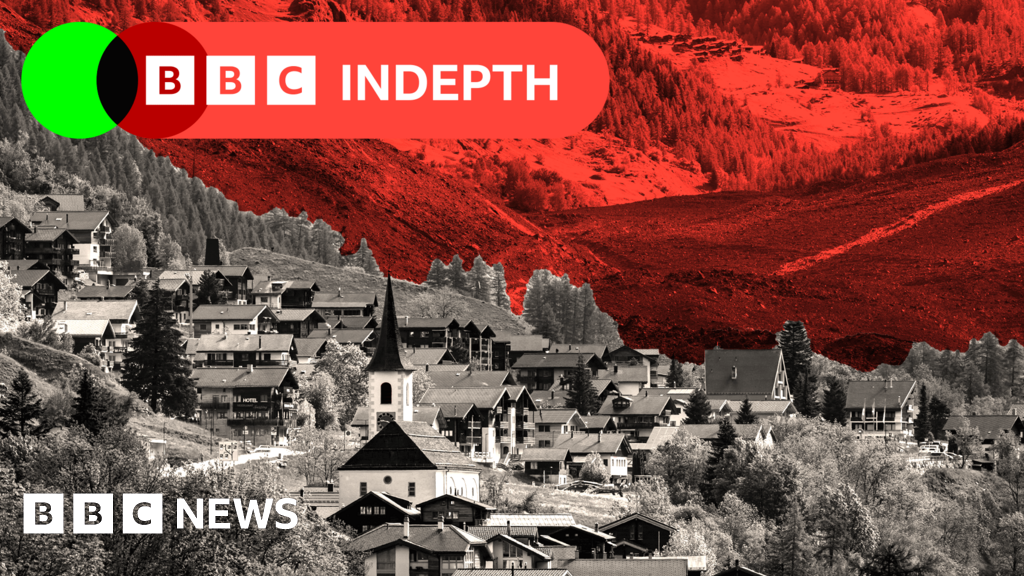Science
Swiss Village Rebuilds After Catastrophic Glacier Collapse

In a devastating incident, the village of Blatten in Switzerland was wiped off the map two months ago when a section of the mountain and glacier collapsed into the valley, forcing the evacuation of its 300 residents. The disaster, which took place in the scenic Loetschental Valley, resulted in the loss of homes, churches, and farms belonging to the community. As recovery efforts commence, the question of whether the steep costs of rebuilding are justified looms large.
Mayor Matthias Bellwald, who is overseeing the clean-up and reconstruction from a temporary office in the nearby village of Wiler, reports that the site could be cleared by 2028, with new housing expected by 2029. The price tag for rebuilding Blatten is estimated to reach hundreds of millions of dollars, with costs potentially exceeding $1 million (USD) per resident. In response to the disaster, voluntary contributions have raised millions in Swiss francs, while both the federal government and the canton have promised financial support.
The collapse in Blatten has raised alarm over the stability of Switzerland’s mountainous regions. With approximately two-thirds of the country characterized by mountains, climate scientists warn that the ongoing thaw of glaciers and permafrost is increasing the likelihood of landslides. The Swiss government currently spends nearly $500 million annually on protective structures, but a 2007 report for the Swiss parliament suggested that comprehensive protection could cost six times that amount. This raises critical questions about the sustainability of preserving alpine communities.
The Alps hold significant cultural value in Switzerland, with each valley representing unique traditions and identities. Lukas Kalbermatten, who lost a family hotel in Blatten, reflects on the emotional toll of losing not just buildings but cherished memories: “The feeling of the village, all the small alleys through the houses, the church… all this is gone.” The loss of such places has prompted many to consider what might happen if more villages face similar fates.
Despite the devastation, residents initially believed the evacuation was precautionary. Retired businessman Fernando Lehner expressed disbelief at the scale of the disaster, recalling the moment the glacier fell. “We knew there would be a landslide that day… But it was just unbelievable,” he stated. As recovery operations progress, the community’s focus is shifting towards the future, though some residents remain reluctant to discuss climate change.
Experts like Matthias Huss, a glaciologist from Zurich’s Federal Institute of Technology, assert that climate change was a significant factor in the disaster. Huss explains that the thawing of permafrost at high elevations contributed to the mountain’s instability, leading to the catastrophic collapse. Research from the Swiss Federal Research Institute indicates that climate change is rapidly transforming high mountain environments and increasing the frequency of mass movements.
The situation is not unique to Blatten. In the region of Graubünden, the village of Brienz has been evacuated for over two years due to similar risks. Heavy rainfall in July raised concerns about imminent landslides in other areas, including Kandersteg, where residents now have an evacuation plan. The unpredictable nature of geological events is causing widespread anxiety across alpine communities.
The financial implications of rebuilding are significant, prompting discussions about whether all villages can or should be saved. An editorial in the Neue Zürcher Zeitung questioned Switzerland’s wealth distribution model, which supports remote communities at the expense of urban centers. The article posited that with climate change making such incidents more common, public willingness to fund the preservation of alpine culture may be waning.
Cultural heritage remains a priority for many Swiss people. The term “heimat” embodies a deep emotional connection to one’s birthplace, often encompassing memories of childhood. For residents like Kalbermatten, the fear of losing their cultural identity is palpable. He warns of the consequences faced by regions where depopulation has led to cultural erosion, citing examples from northern Italy where once-thriving communities have become ghost towns.
As recovery efforts continue in Blatten, the determination to rebuild is evident. Local restaurants are filled with engineers and cleanup teams, and the military is actively involved in the recovery operations. Sebastian Neuhaus, commander of the Swiss army’s disaster relief readiness battalion, emphasized the importance of moving forward, stating, “We have to. There are 300 life histories buried down there.”
The resilience of the community is palpable, as residents remain committed to rebuilding their lives and preserving their heritage. As Kalbermatten put it, “If we see someone from Blatten, we hug each other… and that’s the most important thing, we are all still here.” The struggle to balance the preservation of cultural identity with the realities of climate change will continue to shape the discussion around the future of Switzerland’s alpine villages.
-

 Health3 months ago
Health3 months agoNeurologist Warns Excessive Use of Supplements Can Harm Brain
-

 Health3 months ago
Health3 months agoFiona Phillips’ Husband Shares Heartfelt Update on Her Alzheimer’s Journey
-

 Science1 month ago
Science1 month agoBrian Cox Addresses Claims of Alien Probe in 3I/ATLAS Discovery
-

 Science1 month ago
Science1 month agoNASA Investigates Unusual Comet 3I/ATLAS; New Findings Emerge
-

 Science4 weeks ago
Science4 weeks agoScientists Examine 3I/ATLAS: Alien Artifact or Cosmic Oddity?
-

 Science4 weeks ago
Science4 weeks agoNASA Investigates Speedy Object 3I/ATLAS, Sparking Speculation
-

 Entertainment4 months ago
Entertainment4 months agoKerry Katona Discusses Future Baby Plans and Brian McFadden’s Wedding
-

 Entertainment4 months ago
Entertainment4 months agoEmmerdale Faces Tension as Dylan and April’s Lives Hang in the Balance
-

 World3 months ago
World3 months agoCole Palmer’s Cryptic Message to Kobbie Mainoo Following Loan Talks
-

 Science4 weeks ago
Science4 weeks agoNASA Scientists Explore Origins of 3I/ATLAS, a Fast-Moving Visitor
-

 Entertainment4 months ago
Entertainment4 months agoLove Island Star Toni Laite’s Mother Expresses Disappointment Over Coupling Decision
-

 Entertainment3 months ago
Entertainment3 months agoMajor Cast Changes at Coronation Street: Exits and Returns in 2025









